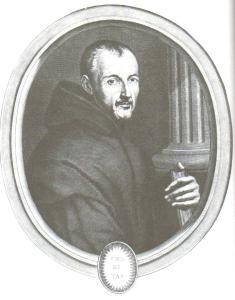In 1624, in Clermont, a prominent provincial family, the Pascals, has a young son, Blaise. He is one year old. Madame Pascal is a young, intelligent, very pious and very charitable woman. She gives aid to poor women, whom she receives regularly at her home to give them food, linen, a little money. Among these poor women, there is one who is reputed to be a witch. Everyone says that she is. But Mme Pascal ignores this gossip. She is not a credulous person. And she continues receiving the so-called diabolical woman.
Baby Pascal is not well. Not well at all. He has fallen into languor, as they say at this epoch. He is wasting away. And this wasting is accompanied by two singular reactions. He is absolutely unable to stand seeing water. Water in a glass, water flowing from a jug: he is immediately seized with terrible convulsions. Second singularity: he cannot tolerate seeing his father and mother together. He lets his father embrace him. He lets his mother caress him. But as soon as his parents are together near him, he screams, he struggles violently, he suffocates.
He is going on for two years old. But will he make it? He is getting weaker. His attacks are more and more exhausting. It is easy to see that he is going to die.
And all the poor women, and a lot of other people in Clermont, are saying that it is the witch who has cast a spell on him. Blaise’s father, Etienne Pascal, wants to put a stop to what he considers to be absurd gossip. One day, he convokes this woman to his study. She denies everything.
However, just to be sure, and to frighten her, he tells her that if she has bewitched his child, he will have her hanged. To his stupefaction, the woman drops to her knees and confesses that she has indeed put a spell on the child, but that it was the father’s fault because he hadn’t wanted to take her case when she had asked him to do it. She says that she took her revenge, but now she sees that he loves his son tenderly, and she is very upset to have to tell him that the spell is for death. But, if he does not denounce her, his son will not die. She can save him. She can transfer the spell onto another.
Honest Etienne Pascal replies that he prefers to let his son die than cause the death of someone else. The witch tells him that she can transfer the spell onto an animal. And President Etienne Pascal proposes one of his horses. The witch says that a cat will do. And he has a cat given to her.
This extraordinary conversation is with a very eminent and very enlightened man. Etienne Pascal was President of the Cour des Aides, in Clermont. Richelieu estimed him. He was a well-known physicist and mathematician, who corresponded with the scholars of his century.
That evening, the witch returns. She explains to Etienne Pascal that she needs a child under seven years old to gather, before dawn, nine leaves of three sorts of herbs. Etienne Pascal goes to his apothicary, whose daughter will gather the herbs.
At seven o’clock in the morning, the witch brings a cataplasm. It must be placed on little Blaise’s stomach. The father has it placed there by the nurse. And he leaves for the Palais. When he returns, at midday, the household is in tears. Blaise Pascal is dead in his cradle.
He leaves, upset, lost in grief. On the doorstep, he meets the witch. His slaps her so hard that she rolls on the ground. She rises and tells him not to get angry. She forgot to tell him that morning that his child would appear to be dead until midnight. But at midnight, he would ressuscitate.
The child was no longer breathing; he had no pulse, and he was becoming cold. Etienne Pascal says that he must not be buried, that they should wait. And alone, in the bedroom, all the rest of the day and night, the father and mother of Blaise Pascal watch. And between midnight and one o’clock, the dead child starts to yawn.
He is seized, rubbed, heated, given sweetened wine and the nurse is called. He suckles her breast, but seems unconscious, and his eyes are still closed. Then, at six o’clock in the morning, he opens his eyes. Discovering his parents bending over him, he goes into convulsions, like before. He is not cured at all.
However, after a few days, he plays with a glass of water while in his mother’s arms. After two weeks, the sight of his father and mother together even makes him smile. After three weeks, his languor disappears. He regains strength. He will live.
Is he completely cured? It is not certain. Blaise Pascal died aged thirty-nine, from an illness about which there are still questions. And he always complained of bizarre discomforts. How did the extraordinary adventure of his childhood affect the body and mind of the author of Pensees? And, later, he must have asked questions about the mysterious beginnings of his life. And these questions must have nourished part of his mystical genius.
***
We omitted one detail. The witch took a cat away with her. On the stairs of the Pascal house, she passed two Capucins who were mounting to console Mme Pascal for her son’s fatal illness. They knew this woman by reputation. One of them placed his hand on the cat and said:
“Good woman, you are again going to perform some spell!”
The witch then threw the cat out the window with such violence that it was crushed on the courtyard pavement. Then she asked for another cat, which was given to her. Apparently, the animal touched by a monk was no longer suitable for magical operations.
To be continued.






